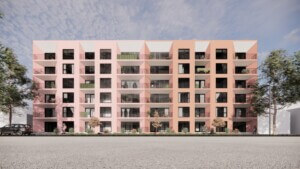Following a failure to pass housing legislation through the New York State Legislature earlier this year, Governor Kathy Hochul announced new executive action on housing at a press conference in Brooklyn yesterday. The executive action will push through housing in Gowanus, Brooklyn, create a funding incentive structure for municipalities that are designated by the state as Pro Housing Communities, and review state-owned land for potential housing projects.
In 2021 the New York City Council passed the rezoning of 82 blocks in Gowanus that promised 8,500 new apartments. Last year, the State Legislature let a tax subsidy—421-a, which gave tax breaks to developers on multifamily project (often including some below-market-rate housing)—expire. The expiry of the program, which cost the city $1.77 billion in tax revenue per year, was advocated by public figures like New York City Comptroller Brad Lander and opposed by private real estate interests. Part of the subsidy program, 421-a(16), gave developers a 100 percent property tax exemption for developers during a three-year construction period and for the first 25 years post-construction, and an exemption equal to the percentage of affordable units for a further ten years.
Under Hochul’s executive action, developers in Gowanus can submit multifamily projects to a request for applications run by Empire State Development (ESD) and if eligible, ESD would purchase the properties from the developers “for a nominal fee.” ESD would then lease the property back to the developer for a period of time for which a 421-a(16) tax break would last, and turn the deed over to the property owner following the expiration of that lease. The property owner will have to pay ESD the equivalent of the reduced tax cost that the developer would have paid if the project would have qualified under 421-a(16). In order to be eligible, projects must fall within the Gowanus rezoning plan, be currently vested in the expired program, contain at least 50 units of housing, meet the affordability requirements of the 421-a(16) plan and keep affordable units permanently affordable, among other requirements. In short, this will guarantee the continuance of tax breaks for developers already working on projects in the Gowanus rezoning area.
Elsewhere in the state, the governor is creating an incentive structure to have municipalities meet Pro Housing Community designation status. The program, created through executive order, will reward communities that build more housing. This includes a community’s efforts to “streamlining permitting and adopting pro-housing policies” and submitting housing and zoning data to the state to track progress. A one percent annual growth in housing stock for downstate municipalities and a 0.33 percent increase for upstate communities will further qualify municipalities for top prioritization for a slew of state funding pools totaling $650 million. The executive order also “directs New York State agencies, public authorities, public benefit corporations, and related State entities” to take housing production into account for their own policy decisions.
Governor Hochul said that “New York’s housing crisis isn’t going away, and I’m committed to doing everything in my power to make New York more affordable and livable for all…These executive actions are an important first step to expand our housing supply and promote housing growth. But make no mistake: to fully address the scope of this crisis, we need action from the legislature — and I’m committed to continuing our work on housing in the coming months.”
Furthermore, Hochul has directed all state entities to review landholdings for potential housing sites, or to “support nearby housing development.” To kick this off, the state has announced a request for proposals (RFP) for Javits Center Site K, a 1.2-acre site between Manhattan’s Hudson Boulevard West and 11th Avenue and 35th and 36th Streets, and for the 80-acre site of the now-vacated Downstate Correctional Facility in Fishkill.
All together, the set of actions will give significant power to ESD, and shows that the current gubernatorial administration is willing to take matters into its own hands when it feels that municipalities are not acting fast enough. Further tax exemptions for private developers in Gowanus may appear crass as the city’s rental prices continue to ascend under pressure, and lenient area median income (AMI) requirements on many buildings leave swaths of New Yorkers left out. Incentivizing municipalities elsewhere in the state to ramp-up housing production is needed, although, one has to ask, is setting the incentive structure at one percent (or lower) per year seems out of place with the scale of the housing crisis that the governor herself has identified?
And for those curious, the state has also launched a beta version of its new housing data platform, which will tell you that almost half of state residents are rent burdened.











